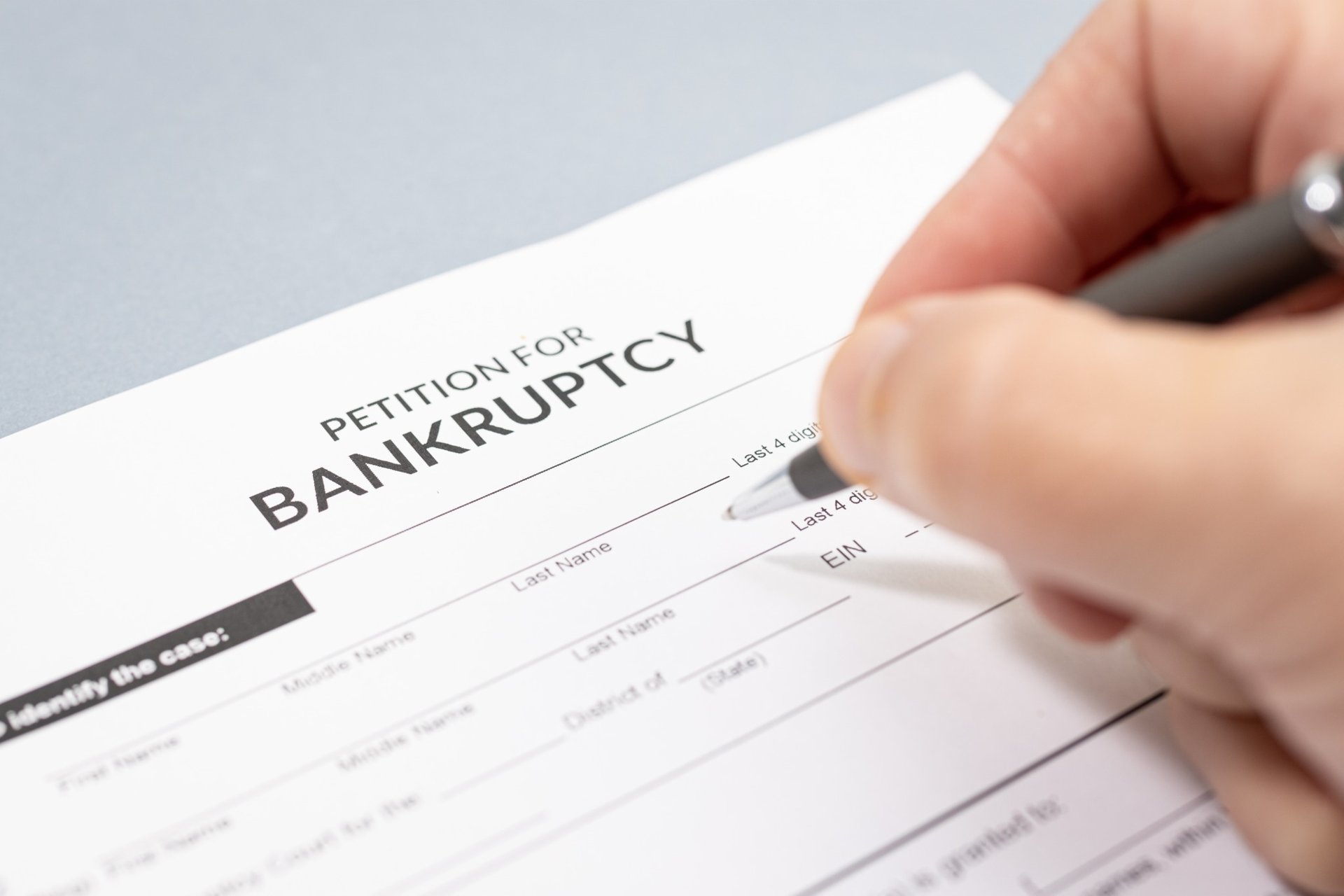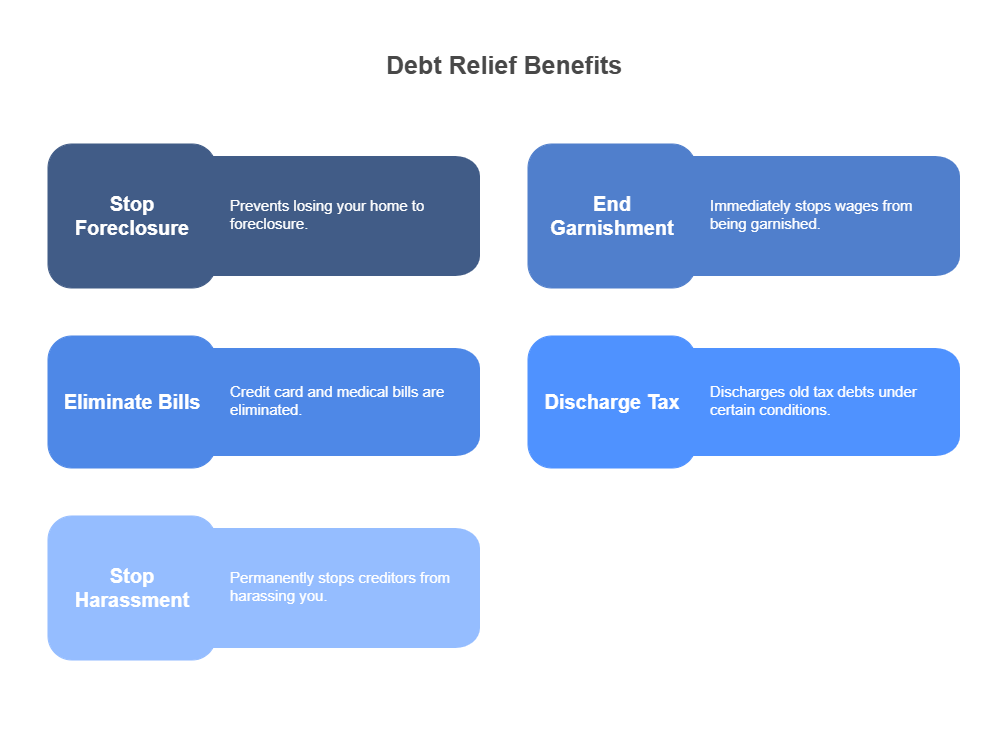Pikeville Bankruptcy Lawyer


When debt becomes overwhelming in Pikeville, you deserve trusted help. Creditor calls disrupting your family time at home, threatening letters piling up, and the fear of losing everything you’ve worked for, keeping you awake at night? You’re not alone, and this isn’t your fault.
Economic hardship can strike anyone, and when it does, the consequences of inaction can be devastating – wage garnishment, foreclosure, repossession, and damaged credit that follows you for years.
There is hope. O’Bryan Law Offices, your trusted Pikeville bankruptcy lawyer, has been helping Kentucky families restart, rebuild, and restore their financial lives for over 30 years.
Our board-certified consumer bankruptcy attorney, Julie O’Bryan, and our experienced team have guided more than 30,000 families through the bankruptcy process, offering the compassionate, professional legal services you need during these challenging times.
Our experienced Pikeville bankruptcy attorneys are ready to help you explore your debt relief options. Call (502) 339-0222 or contact us today for your free consultation.
A Brief Overview of Bankruptcy in Pikeville, KY
Bankruptcy isn’t a personal failure – it’s a powerful legal tool designed to give honest individuals and families a fresh financial start. The United States Bankruptcy Code provides federal protections that allow you to eliminate or reorganize your debts under court supervision.
In Kentucky, bankruptcy cases are filed in the US Bankruptcy Court for the Eastern District of Kentucky, which has jurisdiction over our area. The court in Lexington handles cases from throughout Eastern Kentucky, including Pike County residents seeking debt relief.
Here’s how the bankruptcy process typically works:
- Initial consultation: We evaluate your financial situation and determine the best option for your specific circumstances
- Document preparation: Our team gathers all necessary financial records and prepares your petition
- Filing your case: We submit your bankruptcy petition to the court, immediately triggering automatic stay protection
- Meeting of creditors: You’ll attend a brief meeting where the trustee asks questions about your finances
- Discharge: The court eliminates your qualifying debts, giving you the fresh start you deserve
We will help you understand how Kentucky bankruptcy laws apply to your situation so you can protect your rights and make informed decisions throughout the process.
What Bankruptcy Can & Cannot Do For You
Before moving forward, it’s important to understand bankruptcy’s scope and limitations. Federal and Kentucky state laws work together to determine what debts can be eliminated and what property you can protect.
| Bankruptcy CAN | Bankruptcy CANNOT |
|---|---|
| Stop foreclosure and repossession | Eliminate child support or alimony |
| End wage garnishment immediately | Discharge recent tax debts (less than 3 years) |
| Eliminate credit card and medical bills | Remove student loans (except rare hardship cases) |
| Discharge certain old tax debts | Erase court fines or criminal restitution |
| Stop creditor harassment permanently | Eliminate secured debts without surrendering collateral |
If you’re worried about losing your home, learn more about when is it too late to stop foreclosure and how bankruptcy can help.
📌 Understanding the pros and cons of filing for bankruptcy will help you make an informed decision about your financial future.

Why Choose O'Bryan Law Offices as Your Bankruptcy Lawyer in Pikeville, KY?
For nearly three decades, O’Bryan Law Offices has been the go-to firm for Kentucky families facing financial challenges. Julie O’Bryan is one of only six board-certified consumer bankruptcy attorneys in Kentucky, a distinction that requires extensive experience, continuing education, and proven expertise.
Our track record includes:
- Over 30,000 families helped across Kentucky and Southern Indiana
- Board-certified bankruptcy specialist on staff – a rare credential held by less than 1% of attorneys
- Multiple office locations in Louisville, Frankfort, and New Albany for your convenience
- Direct attorney consultation – you’ll speak with a real lawyer, not just staff
- Extensive experience handling complex cases involving small businesses, medical debt, and family financial crises
The Kentucky Bar Association holds all attorneys to high professional standards, and Julie O’Bryan exceeds them. A graduate of the University of Louisville’s Louis D. Brandeis School of Law, Julie brings decades of focused bankruptcy experience and advanced credentials to every case.
Julie has earned the maximum “Superb” rating on Avvo and is recognized by Super Lawyers for her professional excellence. O’Bryan Law Offices is also profiled on Super Lawyers and Justia for our trusted bankruptcy services across Kentucky and Indiana.
Our client-focused approach means we treat every case with the attention it deserves. We understand that bankruptcy often results from life events beyond your control. Contact us today, we’re here to help you recover with dignity and support.
Types of Bankruptcy: Chapter 7 vs. Chapter 13
Choosing the right type of bankruptcy is key to achieving your financial goals. Chapter 7 and Chapter 13 each offer different advantages depending on your income, assets, and debt situation.
| Feature | Chapter 7 | Chapter 13 |
|---|---|---|
| Duration | 3-4 months | 3-5 years |
| Income Requirement | Must pass means test | Must have regular income |
| Debt Relief | Most unsecured debt discharged | Partial repayment + discharge |
| Property Protection | May lose non-exempt assets | Keep assets while repaying |
| Co-Signer Protection | No protection for co-signers | Co-debtor stay protects co-signers |
| Business Debts | Can discharge business debts | Reorganize business obligations |
Chapter 7 works best for individuals with limited income who want to eliminate debt quickly, while Chapter 13 is ideal for those with regular income who need to catch up on mortgage or car payments while protecting assets.
💡 Hypothetical Scenario: A small business owner accumulated $50,000 in personal guarantees when their restaurant closed during economic downturns. Chapter 7 bankruptcy eliminated these business-related debts, allowing them to start fresh without the burden of failed business obligations.
Our experienced attorneys will analyze your financial situation and recommend the option that best serves your long-term interests.
Important Information From Our Pikeville Bankruptcy Attorneys
Filing for bankruptcy involves many complex legal considerations. While this may seem overwhelming, our team will walk you through how each of these areas applies to your specific case during your consultation.
Debts Dischargeable Through Bankruptcy
Dischargeable Debts:
- Credit card balances and personal loans
- Medical bills and hospital debt
- Old tax debts (over 3 years old, with conditions)
- Utility bills and past-due rent
- Business debts from sole proprietorships
- Deficiency balances after repossession or foreclosure
Non-Dischargeable Debts:
- Recent tax obligations
- Student loans (except in cases of undue hardship)
- Child support and alimony
- Court-ordered fines and restitution
- Debts incurred through fraud
Our attorneys review each debt individually to determine the best strategy for your situation.
Protecting Your Assets: Exempt & Non-Exempt Property
Kentucky’s exemption laws allow you to protect essential property during bankruptcy. Understanding these exemptions is key to keeping what matters most to your family.
Kentucky Exemptions Include:
- Homestead: Up to $31,575 in home equity
- Motor vehicle: Up to $5,000 in car value
- Personal property: $3,000 in household goods and clothing
- Retirement accounts: 401(k), IRA, and pension plans
- Tools of trade: Equipment necessary for work
- Insurance: Life insurance cash value is exempt up to $11,525 under Kentucky law.
Our strategic planning helps protect as much of your property as possible while achieving maximum debt relief.
📌 If you’re concerned about your vehicle, learn more about when do I have to surrender my vehicle in a Chapter 13.
Impact on Credit + Life After Bankruptcy
Many clients worry about their credit score and future financial opportunities. While bankruptcy appears on your credit report for 7-10 years, most clients begin rebuilding credit within 12-24 months.
Post-bankruptcy credit opportunities often include:
- Secured credit cards within 6 months
- Auto loans within 1-2 years
- FHA mortgages within 2-3 years
- Conventional mortgages within 4 years
💡 Contrary to popular belief, bankruptcy can increase employability by eliminating financial stress and demonstrating that you’ve taken responsibility for resolving your debt problems.
Automatic Stay Protection
The moment we file your bankruptcy petition, federal law provides immediate relief through the automatic stay. This powerful protection halts creditor collection activities, giving you breathing room to reorganize your finances.
The automatic stay immediately stops:
- Creditor calls: All phone calls and letters must cease within 24 hours of filing
- Wage garnishments: Your full paycheck is protected from creditor seizure
- Lawsuits: Pending collection cases are frozen in place
- Foreclosure: Your home sale is postponed, often providing months to catch up on payments
- Repossession: Vehicle seizure is prevented, allowing you to keep necessary transportation
Co-Signers and Bankruptcy Implications
If family members or friends co-signed loans with you, bankruptcy affects them differently depending on which chapter you file.
Chapter 7 implications:
- Co-signers remain liable for the full debt amount
- Creditors can pursue co-signers immediately after your discharge
- Consider alternative arrangements to protect family relationships
Chapter 13 advantages:
- Co-debtor stay protects co-signers during your payment plan
- Your payments may satisfy the entire obligation
- Better protection for family financial relationships.
📌 Our attorneys structure cases to minimize impact on your loved ones whenever possible. Learn more about does bankruptcy affect a spouse in our detailed guide.
Employment Considerations
Federal law (Section 525) prohibits employment discrimination based on bankruptcy filing. Your employer cannot legally fire you, and potential employers cannot refuse to hire you solely because of bankruptcy.
The Kentucky Commission on Human Rights provides additional protections for Kentucky workers. Many clients find that eliminating financial stress improves their work performance and career prospects.
Timeline of the Bankruptcy Process
Understanding the bankruptcy timeline helps you prepare for important steps and manage expectations throughout your case.
Chapter 7 Timeline:
- Filing to discharge: Approximately 90–120 days
- Meeting of creditors (341 meeting): 30–45 days after filing
- Discharge order: 60–90 days after the meeting
- Case closure: Typically within 4–6 months
Chapter 13 Timeline:
- Plan confirmation hearing: 60–90 days after filing
- Monthly plan payments: Continue for 3–5 years
- Final discharge: After completion of all plan payments
- Total duration: 3–5 years from start to finish
💡 The automatic stay begins the moment your case is filed, stopping creditor actions immediately—often the first sign of relief our clients experience.
Costs Associated With Filing for Bankruptcy in Pikeville
Transparency is important to us. While costs vary based on case complexity, here are typical expenses for Kentucky residents:
| Expense | Chapter 7 | Chapter 13 |
|---|---|---|
| Court Filing Fee | $338 | $313 |
| Attorney Fees (typical) | $1,500-$2,500 | $4,500-$4,750 |
| Credit Counseling | ~$15 | ~$15 |
| Debtor Education | ~$15 | ~$15 |
We offer flexible payment plans to make quality legal representation accessible when you need it most.
Alternatives to Bankruptcy
Honesty is our policy. If bankruptcy isn’t right for your situation, we’ll tell you. Sometimes other debt relief solutions may be more appropriate:
- Debt consolidation: Combining multiple debts into one monthly payment, often effective for moderate debt levels with steady income.
- Debt negotiation: Settling debts for less than the full amount owed, though this can have tax consequences and credit impact.
- Debt management: Working with credit counselors to reduce interest rates and create payment plans, suitable for those who can afford modified payments.
We provide honest assessments and will only recommend bankruptcy if it truly serves your best interests.
📌 Learn about debt settlement pros and cons and understand why you should never pay a collection agency without professional guidance.
Contact a Pikeville Bankruptcy Lawyer at O'Bryan Law Offices Today
You don’t have to face overwhelming debt alone. Whether you’re dealing with creditor harassment, wage garnishment, or the threat of foreclosure, O’Bryan Law Offices is here to help.
With over 30,000 families helped, nearly three decades of focused bankruptcy experience, and one of Kentucky’s few board-certified bankruptcy attorneys leading your case, we offer the trusted legal guidance you need to take control of your future.
Let our compassionate and experienced team help you regain peace of mind and build your financial fresh start.
Call us today at (502) 339-0222 or use our secure online contact form to schedule your free consultation—whatever your questions, we’re here to answer them with honesty, clarity, and care.

FAQs
Will I lose my home if I file for bankruptcy in Kentucky?
Not necessarily. Kentucky’s homestead exemption protects up to $31,575 in home equity, and Chapter 13 bankruptcy specifically allows you to catch up on missed mortgage payments while keeping your home. Many clients successfully save their homes through strategic bankruptcy planning.
How long does bankruptcy stay on my credit report?
Chapter 7 bankruptcy remains on your credit report for 10 years, while Chapter 13 stays for 7 years. However, most clients see credit score improvements within 12-24 months as they eliminate debt and demonstrate responsible financial management.
Can I file bankruptcy if I own a small business?
Yes, sole proprietors can include business debts in personal bankruptcy cases. For corporations or partnerships, business bankruptcy may be necessary. We analyze your business structure and recommend the most effective approach for both personal and business debt relief.
What happens to my retirement accounts during bankruptcy?
Retirement accounts like 401(k)s, IRAs, and pensions are generally protected in bankruptcy under both federal and Kentucky state law. These assets typically don’t count toward the means test and won’t be seized by the trustee.
How soon can I get credit cards after bankruptcy discharge?
Many clients receive secured credit card offers within 6 months of discharge. While interest rates may be higher initially, responsible use of secured cards helps rebuild credit scores quickly. We provide credit rebuilding guidance as part of our comprehensive service.





